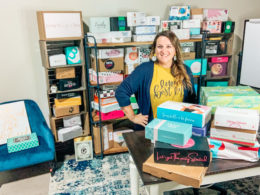“It took an episode of I Love Lucy for Troy and Nancy Scheer to decide on a name for their Dallas-based marketing and advertising company.
“I saw Desilu as the name of their production company,” Troy says. “We thought about what Troy and Nance could be if combined – Trance. It made the name personal, yet something that fit with what we were doing.”
Sometimes finding a name for your business is as easy as that. And sometimes it’s much, much harder. Follow these rules and you’ll be on the right track.
Let’s Get Serious
“A company name should be hard to forget and easy to spell,” says David Crosbie, CEO of Leostream Corp., in Waltham, Mass. “It can’t be too cutesy, otherwise you’ll be mistaken for an L.A.-based hair salon.”
A company’s name should explain in part what the business does, says Crosbie, who has named three companies including Leostream, a provider of conversion software. He based that name on the first computer ever used in business, the Leo Mark III, and “stream” was added “to convey the idea that this business flowed from the original machine,” he says. “Of course, now everyone thinks I’m fond of lions.”
The right name can make a big difference. Pick a loser and you’ll see potential sales, client contacts and repeat customers flow away downstream.
A good entrepreneur spends as much time naming his business as he does developing his business plan, choosing a market and picking a location. Yet almost any name can be effective if it’s followed by an appropriate marketing strategy.
“Acura” was coined by San Francisco, Calif.-based NameLab for Honda Motor Co. It has no dictionary definition but suggests precision engineering, which is what NameLab founder Ira Bachrach wanted. His staff started with the word root “acu,” which means “precise” in many languages. Starting with a meaningful word segment gives startups a better chance of creating meaningful names.
Name It Yourself or Hire a Pro?
If you’re nervous about naming, hire someone to help. Professional naming services can be pricey, costing a few thousand dollars to $35,000 or more, but their elaborate systems lead to the creation of savvy and successful names. (They also know a thing or two about trademark laws.)
Mine dictionaries, magazines and favorite books for ideas. Naming-firms come up with as many as 1,000 potential names to start with; if you’re going it alone, shoot for 10 workable names – you’re likely to eliminate half right off the bat.
Decide what you want the name to communicate. Ideally, it should convey key elements of your business – what you do, who your market is or where you’re located.
But don’t be too local. If you ever want to expand, a local moniker keeps you pigeon-holed in town.
Lonnie Pacelli named his first Seattle-based business after his mother, Concetta, but he changed the spelling to make it easier to find on the Web. When it came time to name his Ascend Business Solutions, Pacelli gave it a dual meaning. First, it communicates what the company does. The second meaning is more personal.
“Because I am a Christian, I wanted a back-meaning of Jesus rising up out of the grave,” he says.
Pacelli spent about a month mulling over possibilities, discussing sobriquets with friends and asking for snap reactions.
“Do a lot of informal market study,” he suggests. And, pick a name “that’s easy to enter into an Internet address. Something really long and complicated, you’re likely to have e-mails going to other people. That’s why I spelled Consetta with an ‘s’ – it’s more phonetically familiar.”
Think Broadly in Your Business-Name Research
If your startup plays to a global market, be sure its name doesn’t have negative connotations abroad. Also, take pains to avoid a name that can be turned into an embarrassment. Revert to your adolescence and think of all the possible variations. If the name can be mutated into something silly, gross or offensive, throw it out.
Don’t be too literal or descriptive; such names are limiting. Evocative names, on the other hand, convey business qualities you want to impart. A bread shop might evoke ideas of freshness and home-baked goodness. It would be time well-spent to make a list of adjectives that call such qualities to mind, then incorporate your favorite one or two in the name.
A business name should set you apart from the competition. And it’s not as simple as choosing one that begins with “A” to get top placement in a phone book or online directory. Just ask AAAA Dental Supply or AAAAAAA Pets ‘n’ Stuff. However you decide what’s in a name, be creative, fun and communicate success.
Lynne Meredith Schreiber is a freelance writer for StartupNation.






